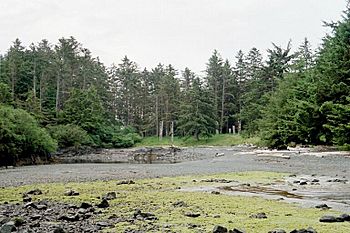Anthony Island (British Columbia) facts for kids
- This page is about the island in Haida Gwaii, British Columbia, Canada. For the island in Newfoundland and Labrador, see Anthony Island, Newfoundland and Labrador
|
Native name:
SG̱ang Gwaay
|
|
|---|---|

Haida Village Site
|
|
| Geography | |
| Location | North Coast of British Columbia |
| Coordinates | 52°5′44″N 131°13′12″W / 52.09556°N 131.22000°W |
| Archipelago | Queen Charlotte Islands |
| Administration | |
| Demographics | |
| Population | (?) |
Anthony Island, also known by its Haida name SG̱ang Gwaay, is a special island located in the southern part of Haida Gwaii. This group of islands is off the North Coast of British Columbia, Canada. Anthony Island is found to the west of Kunghit Island, which is the southernmost island in the Haida Gwaii chain.
The island is famous because it is home to the ancient village ruins of SkungWai, or SG̱ang Gwaay Llnaagay. This village is often called Ninstints, named after a powerful chief from the mid-1800s. SG̱ang Gwaay Llnagaay was once a very important village for the Kunghit Haida people.
Anthony Island is now part of the Gwaii Haanas National Park Reserve and Haida Heritage Site. This means it is a protected area that celebrates both nature and the rich history of the Haida people. The Haida name, SG̱ang Gwaay, describes the sound the wind makes. It sounds like wailing when it blows through a hole in the rocks at certain tide levels.
Contents
Anthony Island: A Place of Ancient Stories
Anthony Island is a small but very important piece of land. It is part of an archipelago called Haida Gwaii. An archipelago is a group of many islands. This island is special because it holds a lot of history and culture from the Haida people.
The Village of Ninstints
The most famous part of Anthony Island is the old village of Ninstints. Its real name in the Haida language is SG̱ang Gwaay Llnaagay. This village was a major home for the Kunghit Haida, one of the main groups of the Haida Nation.
A Glimpse into the Past
Imagine a village filled with tall, carved totem poles. These poles told stories of families, spirits, and important events. Ninstints was one of the last places where these traditional Haida longhouses and totem poles stood. The village was abandoned in the late 1800s. This happened because of diseases brought by Europeans.
A World Heritage Site
Today, the remains of Ninstints are very important. They are protected as a UNESCO World Heritage Site. This means it's recognized by the United Nations as a place of great value to all of humanity. It's one of the best examples of a traditional Northwest Coast First Nations village.
Protecting Haida Heritage
Anthony Island and the village of Ninstints are part of the Gwaii Haanas National Park Reserve and Haida Heritage Site. This area is co-managed by the Haida Nation and the Government of Canada. This partnership helps protect the land, sea, and Haida culture for future generations.
The Meaning of SG̱ang Gwaay
The Haida name for the island, SG̱ang Gwaay, is very descriptive. It means "Wailing Island." This name comes from a unique sound made by the wind. When the tide is just right, the wind pushes through a hole in the rocks. This creates a sound that reminds people of wailing.
Images for kids
 | Leon Lynch |
 | Milton P. Webster |
 | Ferdinand Smith |


